At Christmas 1972, the drink flowed freely on the Mebo II as Radio Northsea International broadcast 24 hours a day, as well as putting out extra World Service programmes. Early in the morning of the
25th the (possibly slightly inebriated) DJs linked up with their neighbours on the mv Mi Amigo where Caroline was broadcasting its Christmas programmes. A.J Beirens and
Robb Eden of RNI and Andy Archer and Crispian St.John of Caroline (both formerly with Northsea) came together for a festive chat.
 Caroline and RNI link up in the early hours of Christmas Day 1972 (duration 2 minutes 37 seconds)
Caroline and RNI link up in the early hours of Christmas Day 1972 (duration 2 minutes 37 seconds)
|
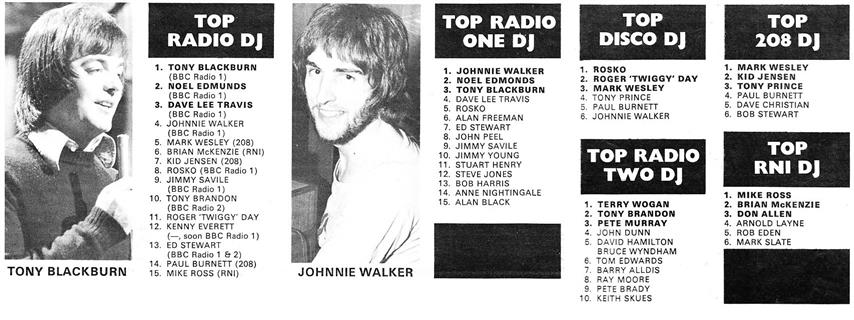
|
|
‘Deejay & Radio Monthly’ publishes the results of its readers' poll with past and present RNI disc-jockeys featuring prominently.
|
On 23rd February 1973 RNI was forced off the air when the Mebo II's anchor chain parted and the ship drifted inside territorial waters.
 Don Allen interrupts Brian McKenzie's Rock'n'Roll Special to announce that the Mebo II has drifted inside the territorial limit and that RNI is having
to go off the air. Recording courtesy of The Offshore Radio Archive (duration 56 seconds)
Don Allen interrupts Brian McKenzie's Rock'n'Roll Special to announce that the Mebo II has drifted inside the territorial limit and that RNI is having
to go off the air. Recording courtesy of The Offshore Radio Archive (duration 56 seconds)
|
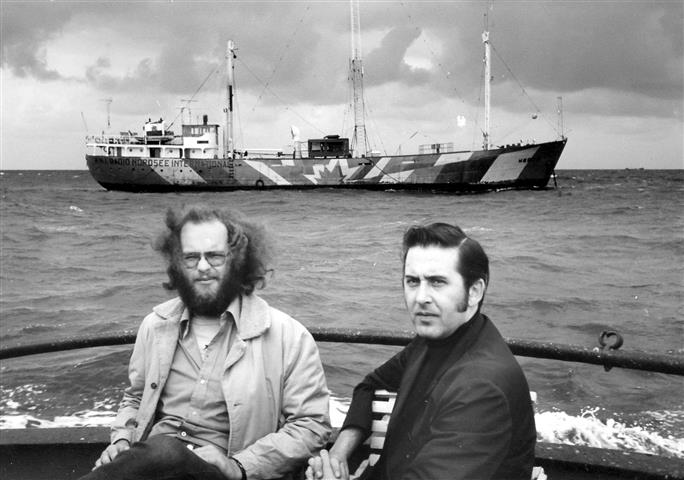
|
|
Dutch DJ/newsreader Leo van der Goot and Senior DJ of the International Service Don Allen on the tender, with the Mebo II in the background. Photo courtesy of Hans Knot and Martin van der Ven's
Flickr archive, copyright Theo Dencker.
|
The engines were started up and the ship was able to steam back to her normal position. RNI returned to the air the following day. On the day after that, a new anchor was fitted. Worse was to follow for
one of Northsea's neighbours. On the night of Monday 2nd April 1973 storms raged in the North Sea. The Veronica ship, the Norderney, lost her anchor, drifted out of control and ended up stranded on Scheveningen beach.
The Mebo II, while not so badly hit, was also silenced when its aerial was damaged in the storm. RNI was off the air for the rest of that night, and most of the next day too, but managed to rig a make-shift antenna to
return on reduced power. By Friday Northsea was back on full power on all but FM, which remained silent for three weeks.
With the Norderney stuck on the beach, Veronica had to close down during what was going to be a critical time for the European stations. The Dutch parliament was about to discuss their future and a big rally was planned for
18th April. In an unprecedented act of goodwill the RNI management offered Veronica the use of its second medium wave transmitter. Because of the danger of intermodulation between the two frequencies, this offer was turned
down and Veronica borrowed Caroline's Mi Amigo instead. This meant it was able to return to the air in time for the massive rally which, although attracting thousands of demonstrators, failed to sway the Members of Parliament
who voted to close the stations down.
During Northsea Goes DX on 13th May A.J Beirens announced that the World Service would close, once again, at the end of that month. His two programmes, the DX show and Our World in Action would however
continue to be broadcast on short wave. On 27th May the final World Service programmes went out. The DJs gave the reason for this close-down as the very evident audio breakthrough from the Dutch medium wave service which
could be heard distinctly in the background but it may not have been coincidence that it occurred at the same time as the closure of the Zurich office and the Dutch company once again taking over responsibility for the
English language programmes.
| RNI PROGRAMME SCHEDULE 1973 |
| Dutch Service, January 1973 |
International Service, June 1973 |
MONDAY-SATURDAY
6.00am Breakfast Show (Gerard Smit or Mark van Amstel)
9.00 Non-stop music
10.00 Peter Holland
12.00pm Tony Berk
2.00 Ferry Maat
4.00 “Driemaster” (Leo van de Goot or Alfred Lagarde)
6.00-8.00 Nico Steenbergen
SUNDAY
7.00am Peter Holland
9.00 Breakfast Show
11.00 Top 20
12.00pm Father Abraham
2.00 Sunday afternoon with all the DJs
4.00 “Say it with Records” (Piet Romer)
6.00-8.00 “Driemaster”
(Central European Time)
|
MONDAY-THURSDAY
8.00pm Mike Ross
10.00 Brian McKenzie
12.00am Don Allen
3.00 Closedown
FRIDAY
8.00pm “International Top 30”
10.00 “Rock'n'Roll Special”
12.00am Don Allen
SATURDAY
3.00-6.00am “Skyline”
8.00pm Mike Ross
10.00 “Country & Western Jamboree”
12.00am Brian McKenzie
SUNDAY
3.00-7.00am “Skyline”
8.00pm “Hitback Show”
10.00 “Request Show”
12.00am Don Allen or Brian McKenzie
3.00 Closedown
(British Summer Time)
|
June 1973 saw the publication of the Dutch version of the Marine Offences Bill. The November 1972 election had resulted in the anti-pirate Labour Party winning the majority of seats in the coalition
government and, after thirteen years of offshore radio, Holland was about to legislate. On 28th June ninety-five members of the Chamber of Deputies voted in favour of ratifying the Strasbourg Convention, only 37 opposing the
move. On the day before this vote Radio Northsea applied for time on the national Hilversum network. Under the Netherlands' broadcasting system at the time, any group or association with more than 15,000 members was entitled
to airtime - the more members, the more time. RNI began collecting names for the final day of reckoning.
|
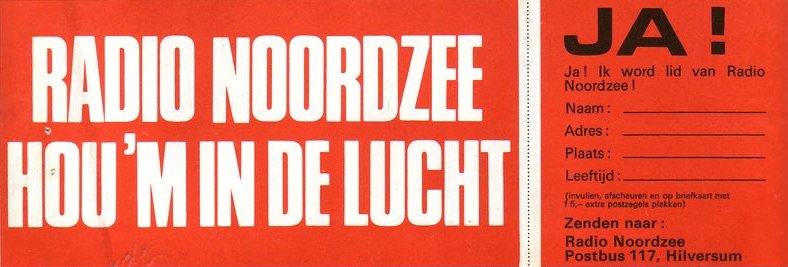
|
|
RNI campaign leaflet. “Hou'm In De Lucht” translates as “Keep It On The Air”.
|
 Graham Gill broadcasting on RNI in the early hours of 28th June 1973, recorded from the station's FM outlet. When Graham introduces “Barry Price”, he probably means Barry White!
This clip is edited from a tape shared on The Offshore Radio Club Forum by Hans Hendriks. Our thanks to him (duration 3 minutes 9 seconds)
Graham Gill broadcasting on RNI in the early hours of 28th June 1973, recorded from the station's FM outlet. When Graham introduces “Barry Price”, he probably means Barry White!
This clip is edited from a tape shared on The Offshore Radio Club Forum by Hans Hendriks. Our thanks to him (duration 3 minutes 9 seconds)
 A.J Beirens from Northsea Goes DX on the short wave service of RNI from 26th August 1973 (duration 1 minutes 32 seconds)
A.J Beirens from Northsea Goes DX on the short wave service of RNI from 26th August 1973 (duration 1 minutes 32 seconds)
Although the end was in sight and the fate of the ship was uncertain, the DJs continued to sound optimistic on the air and on 11th November programming hours were extended to 24 hours a day, just closing
once a week for transmitter maintenance. This extra programme was originally just non-stop music but later included spoken links from Louise Quirk of Manx Radio, recorded on land.
 Louise Quirk on Skyline in the early hours of 24th August 1974 on Radio Northsea International. This is an edited version of a recording available from
www.azanorak.com. Our thanks to Ray Robinson (duration 1 minute 48 seconds)
Louise Quirk on Skyline in the early hours of 24th August 1974 on Radio Northsea International. This is an edited version of a recording available from
www.azanorak.com. Our thanks to Ray Robinson (duration 1 minute 48 seconds)
1973 ended and 1974 began, and the legislation still had not been passed - despite the arrival of a fourth ship off the coast. The Jeanine had dropped anchor off Belgium, although tendered from
Holland, and was broadcasting as Radio Atlantis. On 22nd January 1974 the Upper House of the Dutch Parliament followed the example of the lower one and voted the bill through for its first
reading.
 Rude reggae singer Judge Dread sings the praises of RNI, one of the few stations to play his records. Recording shared on Facebook by Paul Vos. Thanks to him (duration 1 minute 31 seconds)
Rude reggae singer Judge Dread sings the praises of RNI, one of the few stations to play his records. Recording shared on Facebook by Paul Vos. Thanks to him (duration 1 minute 31 seconds)
| RNI PROGRAMME SCHEDULE, MARCH 1974 |
| Dutch Service |
International Service |
MONDAY-FRIDAY
6.00am Dick de Graaf
9.00 Non-stop music
10.00 Ted Bouwens
12.00pm Tony Berk
2.00 Ferry Maat
4.00 Leo van de Goot
6.00-8.00 Mark van Amstel or Eric Post
SATURDAY
6.00am Dick de Graaf
8.00 Mark van Amstel or Eric Post
10.00 Sports Programme
12.00pm “Super Top 50”
3.00 Oldies Show
5.00-8.00 “Driemaster”
SUNDAY
6.00am Ted Bouwens
9.00 Mark van Amstel or Eric Post
11.00 Dutch music
2.00pm Soul Show
4.00 Piet Romer
6.00-8.00 “Driemaster”
(Central European Time)
|
DAILY
8.00pm Don Allen
10.00 Brian McKenzie
1.00am Graham Gill
4.00-6.00 “Skyline”
Specialist shows:
FRIDAY
8.00pm “RNI Toppers”
10.00pm-12.00am “Rock'n'Roll Special”
SATURDAY
8.00-10.00pm “Country & Western Jamboree”
SUNDAY
8.00pm “Hitback Show”
10.00pm-12.00am “Request Show”
MONDAY
12.00-2.00am “Contemporary Music Programme”
(British Summer Time)
|
 Roger Kent on the Hitback Show on 1st June 1974, recorded from the FM outlet of RNI (duration 5 minutes 52 seconds)
Roger Kent on the Hitback Show on 1st June 1974, recorded from the FM outlet of RNI (duration 5 minutes 52 seconds)
 Brian McKenzie on the penultimate Rock'n'Roll Special on RNI from 16th August 1974, also recorded from FM. Both these clips are taken from longer recordings shared by The Offshore Radio Archive
(duration 3 minutes 45 seconds)
Brian McKenzie on the penultimate Rock'n'Roll Special on RNI from 16th August 1974, also recorded from FM. Both these clips are taken from longer recordings shared by The Offshore Radio Archive
(duration 3 minutes 45 seconds)
|
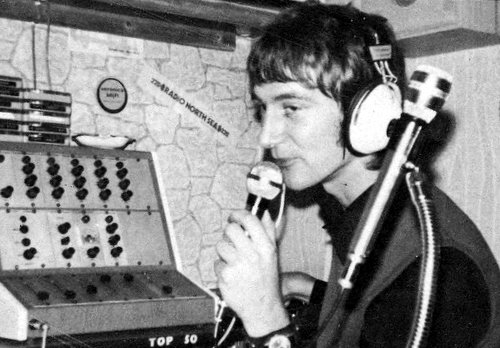
|
|
Robin Banks. Photo by the Southend & District Free Radio Campaign, reprinted from ‘Dee Jay & Radio Monthly’.
|
On 12th August 1974 the Dutch Government announced that its anti-pirate law would come into effect on 1st September. Northsea revealed that it would close the day before. The Dutch organisation had
failed to attract enough members to achieve any airtime on Hilversum so it really was going to be the end. However, although Northsea was to close, there were still plans for the ship. The official story was that, after the
closedown, the Mebo II was going to be refitted and serviced before sailing to a new position off Savona, Italy, to operate as Radio Nova International. In Italian by day, English at night, it seemed that some sort of
“RNI” might survive.
 Don Allen talking about the planned Radio Nova International on RNI, 24th August 1974. Recording kindly shared on Facebook by Paul de Haan (duration 2 minutes 5 seconds)
Don Allen talking about the planned Radio Nova International on RNI, 24th August 1974. Recording kindly shared on Facebook by Paul de Haan (duration 2 minutes 5 seconds)
At midnight on Friday 30th August 1974 the English-language International Service came to an end. Don Allen, Brian McKenzie, Bob Noakes, Roger Kent and Robin Banks all made their
farewells and, once again, went though the sad routine of closing down Radio Northsea.
 Brian McKenzie starts the final hour of the International Service of RNI, 11pm to midnight on 30th August 1974. First up, Roger Kent and Bob Noakes say their goodbyes (duration 3 minutes 59 seconds)
Brian McKenzie starts the final hour of the International Service of RNI, 11pm to midnight on 30th August 1974. First up, Roger Kent and Bob Noakes say their goodbyes (duration 3 minutes 59 seconds)
 Robin Banks and A.J Beirens are next (duration 4 minutes 24 seconds)
Robin Banks and A.J Beirens are next (duration 4 minutes 24 seconds)
 It's time for Don Allen and Brian McKenzie (duration 10 minutes 46 seconds)
It's time for Don Allen and Brian McKenzie (duration 10 minutes 46 seconds)
 Former RNI DJ Andy Archer lists all the broadcasters who have worked on the station, Don and Brian go through the history and then it's all over. Most of these clips are taken from an excellent
quality recording posted by Hans Hendriks on The Offshore Radio Club Forum. Part of the final section comes from another recording shared on
www.azanorak.com by Theo Bakker. Our thanks to both (duration 9 minutes 3 seconds)
Former RNI DJ Andy Archer lists all the broadcasters who have worked on the station, Don and Brian go through the history and then it's all over. Most of these clips are taken from an excellent
quality recording posted by Hans Hendriks on The Offshore Radio Club Forum. Part of the final section comes from another recording shared on
www.azanorak.com by Theo Bakker. Our thanks to both (duration 9 minutes 3 seconds)
The following day a number of special programmes in various languages were broadcast on short wave while, on medium wave, the Dutch DJs presented their last shows live from the ship. At 6pm Radio Veronica
closed down. At 7pm Radio Atlantis followed suit and an hour later, at 8pm, both services of RNI ended transmissions. The station had closed before, back in 1970, but this time it really was the end for Radio Northsea
International.
 The International Service DJs join their Dutch colleagues and station manager John de Mol in the studio during the final minutes of the Dutch Service of RNI just before 8pm on 31st August 1974. The first voice is Ferry Maat.
Taken from a studio recording shared on The Offshore Radio Club Forum by Hans Hendriks. Our thanks to him (duration 10 minutes 46 seconds)
The International Service DJs join their Dutch colleagues and station manager John de Mol in the studio during the final minutes of the Dutch Service of RNI just before 8pm on 31st August 1974. The first voice is Ferry Maat.
Taken from a studio recording shared on The Offshore Radio Club Forum by Hans Hendriks. Our thanks to him (duration 10 minutes 46 seconds)
The station's life had been anything but uneventful. The ship had been attacked violently on two separate occasions and had broadcast on at least thirteen different frequencies. RNI's background had always been
shrouded in mystery and many questions remained unanswered: There were the allegations of secret coded broadcasts from the ship; where had Meister and Bollier raised the enormous sums of money needed for their expensive project? Was
there, as had been claimed in Paul Harris's book To Be A Pirate King (and later included in the revised sixth edition of
When Pirates Ruled The Waves), a link with Communist eastern Europe? And the breakaway state of Biafra? Why did the Governments
of Britain and Norway think it worth jamming a pop music station? Was there an ulterior motive to RNI's election campaign? Whatever the answers to these and other questions, they were unimportant to the vast audience and indeed to the
presenters and crew who worked on the ship. They were only interested in the programmes and, although these varied considerably over the four and a half years of its existence, no one could deny that RNI gave enjoyment to millions
throughout many countries. It was going to be widely missed.
(In August 2019 Edwin Bollier, one of the two owners of RNI, posted on Facebook about some of Paul Harris's allegations. That post is here.)
|
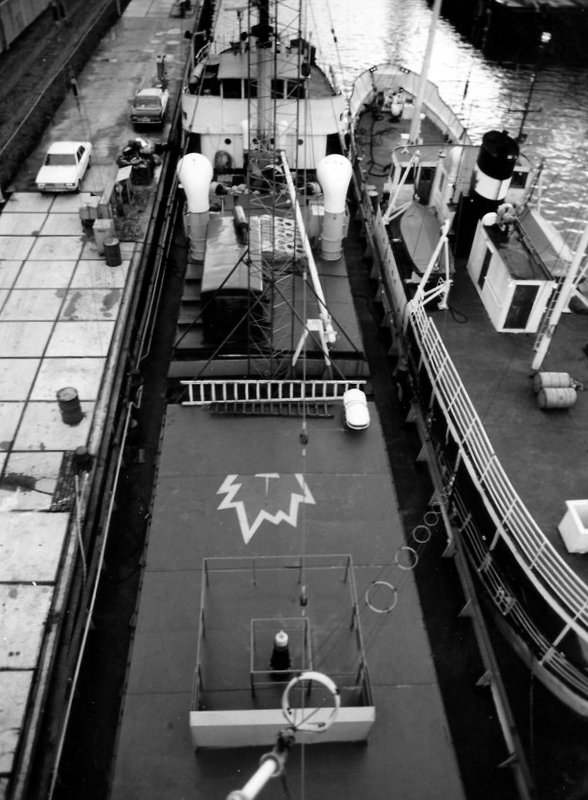
|
|
The Mebo II in Slikkerveer. Photo from the collection of Paul May, kindly provided by Hans Knot.
|
After the close-down the Mebo II was taken to a dry-dock at Slikkerveer near Rotterdam for servicing and a refit in preparation for Radio Nova. The bottom of the ship was scraped, repaired and repainted;
the transmitter was cleaned out and realigned, new aerials were erected, the mast was extended and given a new coat of paint, a third studio and a control room were installed, utilising the equipment from the Bussum studios.
Some £400,000 was spent on improvements.
Then on the 10th October just as the work was nearing completion, the Dutch authorities pounced. The Mebo II was impounded. There had been rumours that the ship was not really going to Italy at all but was to remain in Northern
Europe. The Mebo I (now renamed Angela) had also been refitted and could now carry bigger cargoes. Was RNI going to go back off Holland or Britain and be serviced from Spain, perhaps? Were Meister and Bollier going to make a deal
with Radio Mi Amigo's Sylvain Tack to take over the broadcasting of his station using a second transmitter, as suggested in Bob Noakes's book Last Of The Pirates? Whatever their true plans, they had come to naught.
In December Mebo Ltd was in court, charged with the possession of transmitting equipment. The company claimed that it was only to be used abroad and in fact it had written permission to broadcast in The Gambia. The court was not
impressed by this argument and decided that the ship was only free to leave the country if the transmitters were left behind. Despite the offer of 350,000 guilders compensation, Meister and Bollier were not tempted by this
offer. They brought a further court action, claiming that, as the equipment was on a Panamanian ship, the Dutch authorities had no power to remove it. Meanwhile the Mebo II remained shut in a locked dock.
On 25th March the offer was revised. The ship would now be released on condition the owners promised not to broadcast off Holland and paid an indemnity of 800,000 guilders. This was later reduced to 250,000 guilders and the promise
not to broadcast anywhere in Europe for two years. The ship had to leave the Netherlands within three months. Mebo was happy to accept this but balked at paying the enormous harbour bill that had accumulated while the case was
dragging through the courts.
|
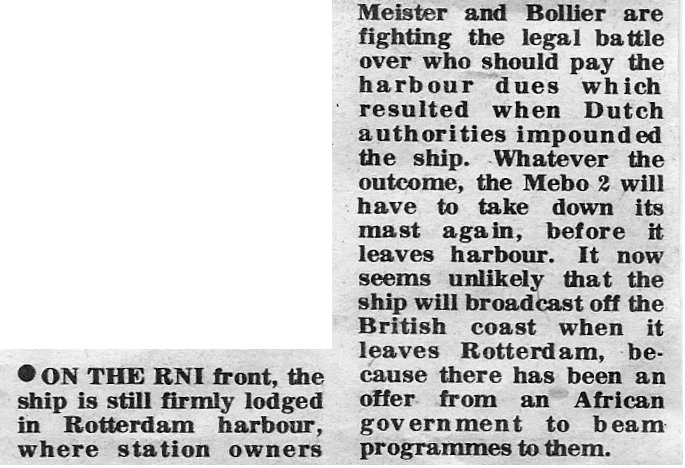
|
|
After months of speculating that RNI would return to the air, ‘Record Mirror’ reports that it isn't going to happen. The Mebo II is heading for Africa. Cutting courtesy of Hans Knot.
|
Another legal battle began and the boat remained locked up. On 2nd January 1976 the High Court in The Hague fined Mebo 5,000 guilders (about £1000) and ruled that the ship and its radio installations
had to leave Dutch territory within three months. Still the company objected and filed a further appeal. Although the fine had been reduced to a trivial level, if the company paid up it would be admitting its guilt and then
be liable to all the harbour dues. In July Mr. Bollier announced that the Mebo II had been sold and would be leaving for Africa on 15th August. He claimed that over the two years of legal wrangling the harbour dues had added
up to some 3 million guilders (about £500,000) and he had spent a further 100,000 guilders (£17,000) on legal costs.
15th August came and went and still the ship stayed put. The only activity came in November when the Mebo II was painted red and green - Libyan colours. The Swiss government introducing their anti-pirate law had forced Mebo Ltd to
sell the ship and it had been bought by a Libyan company for 6 million Swiss francs (about £1,300,000). There was further trouble from the Dutch authorities when two transmitters were taken aboard the Angela: two 10kW
Continental Electronics, bought from Radio Veronica.
Finally on 14th January 1977, at 11.45, after nearly two and a half years, the Mebo II and Angela set sail for Libya. The ships had only reached Rotterdam when the broadcasting vessel was involved in a collision. £3,000
worth of damage was done to two ships and the Mebo II was impounded until this was paid.
Their journey continued on the 16th. Bad weather dogged their passage and slowed them considerably. Finally, on 9th February, the boats reached Tripoli although trouble with their papers held up their entry into harbour until
the 14th.
The ship was later used for relaying the programmes of The Socialist People's Libyan Arab Jamahiriyah Broadcasting Corporation while its shore-based facilities were being overhauled. The last Europeans to work on the ship were two
Dutch engineers, Joop and Koos, with Prinz Holman and former RNI DJ/engineer Robin Banks. These last two were responsible for the final English language programme to be broadcast when at 05.00
GMT on 14th August 1978 an hour long show was put out, illicitly, celebrating and remembering offshore radio on the anniversary of the Marine Offences Act.
In 1981 both the Mebo II and the Angela (by then renamed El Fateh and Almasira) were sunk when used as targets for Libyan rocket practice - a dramatic end to an action-packed episode in the annals of offshore radio.
|

